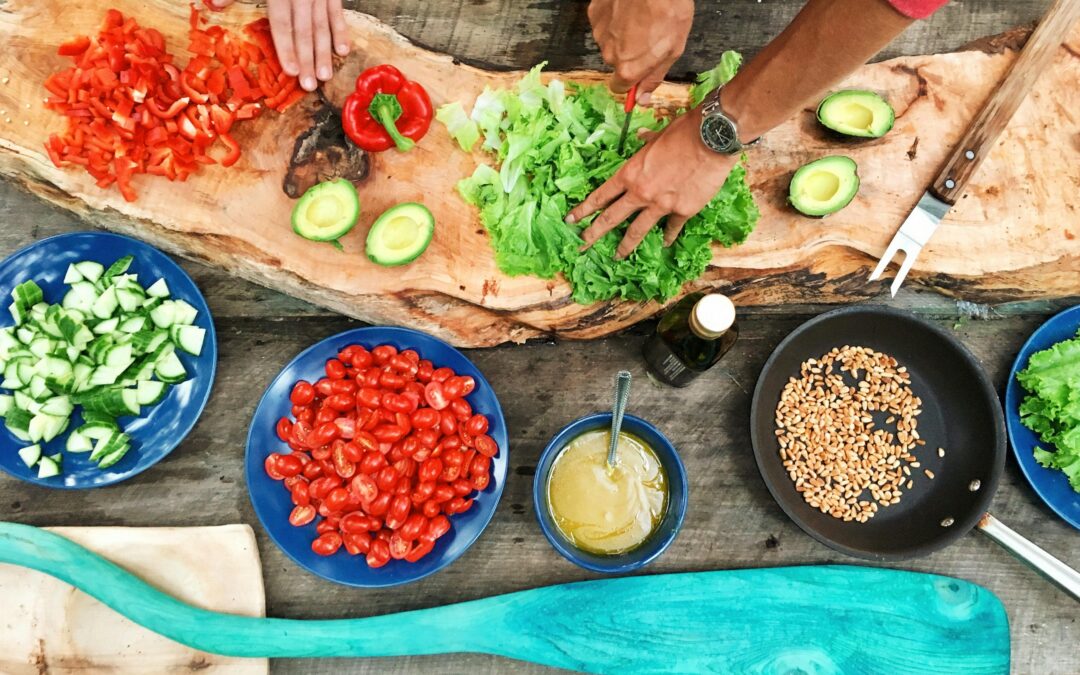As we age, maintaining a balanced diet becomes more critical than ever. However, many seniors face significant challenges when it comes to preparing healthy meals for themselves. Whether due to fatigue, health issues, or simply the lack of desire to cook, older adults often find it hard to stay on track with proper nutrition. For many, this struggle can even lead to a move toward independent living communities, where meal preparation is one less burden to bear.
This post explores why nutritious eating is essential for seniors, particularly the importance of food as medicine and why maintaining adequate protein levels is key to aging healthily. We’ll also discuss how seniors can overcome challenges related to cooking and eating and provide a helpful chart for meal planning and nutritional guidelines.
The Power of Food as Medicine
It’s often said that food is the best medicine—and this is especially true for older adults. A well-balanced diet can help prevent or manage chronic conditions such as heart disease, diabetes, and osteoporosis. The right foods can also boost immunity, improve energy levels, and even enhance mental clarity and mood.
Seniors often require more vitamins and minerals to maintain their health, yet many may not get enough of the nutrients they need, particularly if they’re relying on processed or convenience foods that are low in nutritional value. Whole foods like fruits, vegetables, lean proteins, and whole grains provide the body with the nutrients it needs to repair cells, fight inflammation, and reduce the risk of disease.
The Role of Protein in Senior Health
One of the most important components of a healthy diet for seniors is protein. As we age, muscle mass naturally declines—a condition known as sarcopenia. This loss of muscle strength and function can make everyday activities, like walking or even standing, more difficult and increase the risk of falls. That’s why it’s crucial for older adults to consume enough protein to support muscle maintenance and repair.
The recommended protein intake for seniors is typically higher than for younger adults, as the body becomes less efficient at using protein with age. Ensuring adequate protein intake from sources such as lean meats, fish, eggs, dairy, beans, or plant-based alternatives like tofu and quinoa can help seniors stay strong and mobile.
When Cooking Becomes a Burden
For many older adults, cooking daily meals can become exhausting. Whether due to mobility issues, lack of energy, or even a sense of isolation, cooking for one can feel like a chore, leading to poor eating habits. Skipping meals, relying on convenience foods, or not getting the necessary nutrients can worsen fatigue and contribute to a vicious cycle of declining health.
This is why some seniors opt to move into independent living communities, where healthy meals are provided. These communities offer the benefit of balanced, dietitian-approved menus without the stress of grocery shopping or meal preparation. Access to regular, nutritious meals not only helps maintain physical health but can also improve social engagement, as seniors often enjoy meals in a communal setting.
Simple Tips for Seniors Struggling to Cook
If moving into a community isn’t an option, here are a few strategies to ensure seniors get the nutrition they need:
- Meal Delivery Services: Many services cater specifically to seniors and provide nutritious, ready-to-eat meals. Look for ones that offer fresh, whole-food ingredients and balanced options with adequate protein.
- Batch Cooking: Preparing large quantities of food at once and freezing portions can reduce the need for daily cooking. Soups, stews, and casseroles are great options that freeze well and provide balanced nutrition.
- Keep It Simple: Sometimes, the best meals are the simplest. Focus on easy-to-prepare foods like pre-washed vegetables, pre-cooked meats, or frozen meals that are low in sodium and preservatives.
- Nutrient-Rich Snacks: When meal preparation feels overwhelming, focus on getting nutrients in through snacks. Hard-boiled eggs, yogurt, nuts, and fresh fruit are all easy, no-prep options that pack a nutritional punch.
- Protein Supplements: If getting enough protein from food is difficult, consider protein shakes or powders that can be mixed into smoothies or soups for an extra boost.
Aging is inevitable, but with the right diet, seniors can maintain their health, energy, and independence for as long as possible. By prioritizing whole, nutrient-dense foods—especially those rich in protein—and finding practical solutions to the challenges of cooking, older adults can enjoy a better quality of life.
For those who find meal preparation too tiring or difficult, considering options like meal delivery services or moving to an independent living community can offer the necessary support to continue eating well. After all, the food we eat is not just fuel but a key part of our health and longevity.
Remember: It’s never too late to make small, positive changes to your diet and see lasting benefits!


